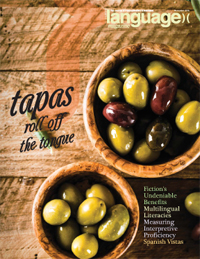Stephen Krashen argues that self-selected pleasure reading of fiction is key to complex text comprehension for first- and second-language learners
I focus on one aspect of the fiction-nonfiction debate here: self-selected pleasure reading of fiction in which there is little or no accountability. Readers are not tested on what they have read, do not have to write book reports, do not have to finish every book they start, and can select, within reason, what they want to read. In addition to books, they can read newspapers, magazines, manga, comic books, and articles from the internet. Also, self-selected pleasure reading can be, and usually is, narrow. Good readers typically focus on one author or genre at a time.



 According to new research by linguists from the University of New Mexico and Laboratoire Dynamique du Langage-CNRS in France, the characteristics of languages have a lot to do with the climate and topogrophy of the environment they emerged in. The study is a more in depth approach to analyzing why
According to new research by linguists from the University of New Mexico and Laboratoire Dynamique du Langage-CNRS in France, the characteristics of languages have a lot to do with the climate and topogrophy of the environment they emerged in. The study is a more in depth approach to analyzing why More than 1 in 5 United States residents speak a foreign language at home and a
More than 1 in 5 United States residents speak a foreign language at home and a  The House of Commons of Canada now speaks English, French, and Punjabi, reflective of the most spoken languages in Canada, after 23 lawmakers of Indian origin were elected to the Parliament in the October 19th general election. 20 of the new Indo-Canadian lawmakers speak Punjabi, which is the 10th most spoken language in the world, and the third most spoken language in Canada. “It speaks to our commitment to diversity and allowing individual to play an important role in our political institutions,”
The House of Commons of Canada now speaks English, French, and Punjabi, reflective of the most spoken languages in Canada, after 23 lawmakers of Indian origin were elected to the Parliament in the October 19th general election. 20 of the new Indo-Canadian lawmakers speak Punjabi, which is the 10th most spoken language in the world, and the third most spoken language in Canada. “It speaks to our commitment to diversity and allowing individual to play an important role in our political institutions,” 
 India and Germany resolved the sticky German language issue during Chancellor Angela Merkel’s visit last month. Once again, students in Kendriya Vidyalaya schools (KVs) will be able to opt for German as an additional foreign language in conformity with the National Education Policy, the Union Ministry of Human Resource Development announced after signing a joint declaration of intent with Germany.
India and Germany resolved the sticky German language issue during Chancellor Angela Merkel’s visit last month. Once again, students in Kendriya Vidyalaya schools (KVs) will be able to opt for German as an additional foreign language in conformity with the National Education Policy, the Union Ministry of Human Resource Development announced after signing a joint declaration of intent with Germany. The BBC, the UK’s national news organization, launched a Japanese site, which becomes its first dedicated non-English news website and helps extend its fledgling global advertising network. Accessible via BBC.jp, it features selected content from BBC.com and the organization’s global news service, which is translated into Japanese. Much of the BBC’s operations is funded by the license fee, a mandatory charge that UK citizens pay to own a TV set, but the new Japanese presence is separate from that. The company said that the Japanese website—which is run by a team of editors based in Tokyo—is its “first fully commercial” non-English news site. In other words, it includes ads, and the BBC is hoping to lure potential advertisers with the promise of eyeballs in Japan.
The BBC, the UK’s national news organization, launched a Japanese site, which becomes its first dedicated non-English news website and helps extend its fledgling global advertising network. Accessible via BBC.jp, it features selected content from BBC.com and the organization’s global news service, which is translated into Japanese. Much of the BBC’s operations is funded by the license fee, a mandatory charge that UK citizens pay to own a TV set, but the new Japanese presence is separate from that. The company said that the Japanese website—which is run by a team of editors based in Tokyo—is its “first fully commercial” non-English news site. In other words, it includes ads, and the BBC is hoping to lure potential advertisers with the promise of eyeballs in Japan. Svetlana Alexievich was awarded the 2015 Nobel Prize in Literature last month, and three countries claimed a piece of her success. Headlines across Eastern Europe called her a “representative of Russian literature,” a “writer born in Ukraine,” and a “Belarusian writer.” In Ukraine, President Petro Poroshenko, the first politician to congratulate Alexievich, wrote: “Wherever we are, whatever language we speak or write—we always remain Ukrainian.” The award generated mixed opinions in Belarus, with some political activists and literary critics questioning Alexievich’s Belarusian identity because she writes in Russian, even though about 70% of the country’s population speaks Russian at home. In Russia, some disowned the writer for criticizing Putin’s policies and called the decision political.
Svetlana Alexievich was awarded the 2015 Nobel Prize in Literature last month, and three countries claimed a piece of her success. Headlines across Eastern Europe called her a “representative of Russian literature,” a “writer born in Ukraine,” and a “Belarusian writer.” In Ukraine, President Petro Poroshenko, the first politician to congratulate Alexievich, wrote: “Wherever we are, whatever language we speak or write—we always remain Ukrainian.” The award generated mixed opinions in Belarus, with some political activists and literary critics questioning Alexievich’s Belarusian identity because she writes in Russian, even though about 70% of the country’s population speaks Russian at home. In Russia, some disowned the writer for criticizing Putin’s policies and called the decision political. The Native Language Immersion Student Achievement Act, originally introduced in early 2014, passed another legislative landmark and was advanced by the Senate Affairs Committee. The measure creates a grant initiative to help establish native language education for Native Hawaiian, American Indian, and Alaskan Native students as well as revitalize and maintain America’s indigenous languages, of which there are approximately 150. “Language is vital to every culture, and schools like Nawahiokalaniopuu on Hawai‘i Island have shown us how Native language education can revive a once near-extinct language and help preserve the traditions and customs of Native communities,”
The Native Language Immersion Student Achievement Act, originally introduced in early 2014, passed another legislative landmark and was advanced by the Senate Affairs Committee. The measure creates a grant initiative to help establish native language education for Native Hawaiian, American Indian, and Alaskan Native students as well as revitalize and maintain America’s indigenous languages, of which there are approximately 150. “Language is vital to every culture, and schools like Nawahiokalaniopuu on Hawai‘i Island have shown us how Native language education can revive a once near-extinct language and help preserve the traditions and customs of Native communities,” 